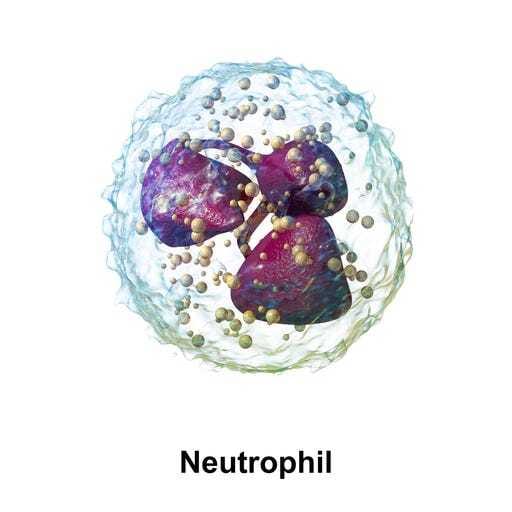It is recommended to screen for anemia (low red blood cell or hemoglobin levels) around one year of age. Our office orders a complete blood count (CBC), which checks for red blood cells, white blood cells, and platelets - the main components of our blood. Sometimes we find things that we weren't looking for. In the winter months, neutropenia is one of those things.
What is neutropenia?
One relatively frequent abnormal lab we see is a low absolute neutrophil count (ANC). A low ANC is also called neutropenia.
What are neutrophils?
Neutrophils are a type of white blood cell that fights bacterial infections. When their numbers get too low, it can increase the risk of serious bacterial infections.
While some people have low ANCs that cause significant immune deficiencies and can lead to infection, the most commonly seen low ANC we see are brief dips after a viral infection.

What causes neutropenia?
Most causes of neutropenia are due to infection, drugs, severe malnutrition or immune disorders.
The most common cause of neutropenia we see in otherwise healthy kids is due to a recent infection. In most cases this type of neutropenia quickly resolves without any treatment.
Some viruses, such as hepatitis B, Epstein-Barr, and HIV, are associated with prolonged neutropenias.
The drugs that can cause neutropenia are not commonly used medications. Routine testing for neutropenia would be done when those medications are used because the risk is known. That's one reason why people with cancer treatments often have regular blood counts checked.
Vitamin B12, folate, and copper deficiencies are very uncommon in children, but can lead to abnormal blood counts.
Three levels of neutropenia:
The large majority of kids with neutropenia have only mild drops in their ANC and are not at significant risk of illness. In general the more severe the drop, the more significant the infection risk.
Mild neutropenia: The ANC ranges between 1000-1500/μL
Moderate neutropenia: The ANC ranges between 500-1000/μL
Severe neutropenia: The ANC is less than 500/μL
What do you do if there's neutropenia?
Since most mild cases of neutropenia self-resolve, it is not usually anything for parents to worry about.
I used to recheck all of these, but found that many kids needed several rechecks because they always had a mild viral infection so the levels stayed suppressed (low). Despite the low ANC, they never got significantly sick.
Of course if there is another clinical reason, such as a significant illness or growth problems, following up even a mild lab abnormality is recommended. If kids start getting sick, their blood counts should be rechecked because of the clinical concern.
When kids are otherwise healthy, I find that we end up chasing abnormal levels if we try to recheck, so I've stopped rechecking automatically.
When a child is overall healthy and growing well, the level is only mildly low (above 1000) I do not recheck the level unless there is a clinical concern. If your doctor wants to recheck it (or if you want it rechecked), that is appropriate to do.
When the level is in the mid-range (500-1000) or if the child has had problems with recurrent infections or growth, a confirmation (repeat test) and possible further evaluation is more likely to be recommended.
If the level is in the severe range (less than 500), it should be rechecked and the child should be closely monitored due to high risk of severe bacterial infections.
Some physicians recommend repeating a blood count with any fever for a year in kids who have had any degree of neutropenia, so you'll have to talk to your child's doctor for a plan.
What symptoms might happen if the ANC is low?
Most children with a temporarily and mildly low ANC will have no symptoms and need no treatment.
Children with chronically low ANCs may have more infections that require antibiotics, such as pneumonia, skin infections (abscesses, cellulitis) and lymph node infections. They might also have chronic gum disease, mouth sores, or vaginal or rectal ulcers.
Common colds often contribute to the temporary dip in the ANC, but are not caused by the low ANC. A different type of white blood cell fights off viral infections, so the low neutrophil count is specific to bacterial infection risk.
Common symptoms seen with neutropenia:
Frequent significant infections (not just the chronic runny nose of a daycare kid)
Serious respiratory infections, including pneumonia or sinus infections
Skin infections (e.g. cellulitis, abscesses)
Multiple serious infections (e.g. meningitis, bone infections)
Lymph node infections
Gum disease
Mouth sores/ulcers
Vaginal, urethral, or rectal ulcers
When should you worry?
The level of ANC as well as the cause both determine the risk level.
Lower levels of neutrophils increase the risk of an overwhelming infection. An example would be when people are immune suppressed from chemotherapy they are at very high risk of bacterial infections.
On the other hand, an otherwise healthy person with a mildly low ANC is not more likely to get a bacterial infection than another person with a normal ANC.
If the child has any of the symptoms noted above or a very low ANC level, we start to worry more. Each case must be evaluated by the person who ordered the test and who has recently seen your child.
What treatment is done for a low ANC?
Most children do not need any specific treatment. They are monitored for recurrent infections, especially infections that require antibiotics. They are also monitored for growth, since if a body is chronically sick, it often doesn't grow well.
Each infection that requires antibiotics is treated and blood counts might be checked to see how low they are at the time.
In children who have a chronically low ANC or a significant illness with a low ANC, a hematologist (blood specialist) is often consulted. They help evaluate why the ANC is low and if it requires a special treatment that stimulates the bone marrow to make more neutrophils.